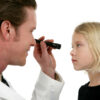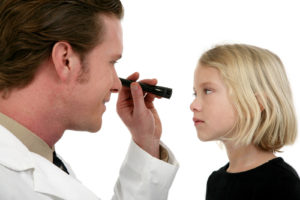
Why Aren’t You Getting Your Child’s Eyes Examined?
If you haven’t yet had your child’s eyes examined, you’re not alone. Many parents are unsure when their children need to start getting eye exams. In fact, it is estimated that fewer than 55 percent of children have a vision screening before the age of 17, which leaves them at risk for unchecked vision issues. Many are on the ball when it comes to taking their children to the dentist but delay vision exams. Why?
It’s not that parents are refusing to take their kids for eye exams. Rather, it’s because it just doesn’t occur to them that their children need regular eye exams. Many parents assume that if there is a problem with their kids’ eyes their kids will say something. However, if their vision has always been poor, they won’t know that something is wrong and they won’t tell you.
Be Aware of the Not-So-Obvious Signs
Some parents also think that if there is a problem with their kids’ eyes, their teachers will notice some behavioral problems. Or, they’ll notice some learning issues. These include difficulty reading, sitting too close to the TV, squinting to see, or acting out due to the frustration of not being able to see clearly. It’s also possible that many parents assume that if they themselves don’t have eye or vision problems, their child won’t either. The thing is, not all vision problems present themselves with obvious symptoms.
The reason more parents take their children in for dental exams more often than eye exams is that dental problems can usually be seen, such as cavities or chipped teeth. Kids are also much more vocal about whether their teeth or mouths hurt. And, it’s constantly drilled into everyone’s brains that dental care is important, and brushing and flossing are essential for keeping your teeth healthy. More parents know to take their kids in for dental exams on a regular basis.
Eye Problems in Children
 The chances of your child having a severe visual impairment or eye disease are rare. However, the chances of your child having less severe eye issues such as hyperopia (farsightedness) or amblyopia (lazy eye) are much more common. In fact, one out of four kids has some kind of eye or vision problem. This is why regular eye exams are so important.
The chances of your child having a severe visual impairment or eye disease are rare. However, the chances of your child having less severe eye issues such as hyperopia (farsightedness) or amblyopia (lazy eye) are much more common. In fact, one out of four kids has some kind of eye or vision problem. This is why regular eye exams are so important.
Some children may have problems with focusing their eyes or with coordination of both of their eyes. Or, your child could have developmental disorders with their eyes. These are only evident with a thorough eye examination.
Some parents forgo taking their kids to the eye doctor because they are afraid the doctor will prescribe glasses when they aren’t really needed. There are people who believe that wearing glasses can actually weaken your eyes. This may also be another reason that parents don’t have their child’s eyes examined regularly.
Warning Signs of Vision Problems
You shouldn’t wait for the warning signs to become apparent before having your child’s eyes examined. There are various signs you can look for between exams that will alert you to issues that should be checked on right away. Here are some of the most common signs:
- Your child has begun sitting really close to the TV or holding their book close to their face.
- Your child suddenly starts losing their place or using their finger to keep from losing their place.
- You notice that your child has started squinting or tilting their head to the side when trying to see or read something.
- Your child begins rubbing their eyes a lot. This could be a sign that there is a problem with their eyes, such as blurry vision or not being able to focus.
- They have developed a sudden sensitivity to light and/or their eyes excessively tear up. You should take them in to have their eyes checked.
- They begin trying to avoid things that require close vision such as doing their homework or reading. Similarly, they avoid things that require distance vision such as playing sports or doing other types of activities.
- They begin complaining about frequent headaches or tired and sore eyes.
Lastly, pay attention to their grades. Slipping grades in school can be a sign that your child is struggling to read quiz questions properly or write accurately. It may not be that they don’t like school or that they aren’t understanding the material. Both problems can be caused by vision issues. There are many vision problems that parents may miss, so it’s important to let an eye doctor be the judge of your child’s vision. You want your child to succeed in all areas of their life. So, their vision health is of the utmost importance.
Recommended Eye Exams
You should always take your child in for an eye exam if you notice that there may be an issue. The American Optometric Association has a recommended timetable of when and how frequently eye exams should be performed for all ages.
Kids should have their first eye exam by six months old. They should have another one at around three years old, and then one more just before they start school. Once they enter school, they should have an eye exam every two years if no vision problems are detected. However, if your child has glasses, they should go to the optometrist more regularly.
The reason it’s so important that kids receive regular eye exams is that their prescriptions can change pretty quickly as they grow and develop. It’s also important to make sure that your child has the visual skills necessary for extracurricular activities. Playing sports and riding a bike are a fundamental part of childhood that they won’t want to miss. Plus, you don’t want anything standing in the way of their academic development, either.
Your eyes are just as important to maintain and keep healthy as your teeth or any other part of your body. So, be sure to keep up with those eye exams. Pay close attention when your child starts exhibiting any of the warning signs listed above.
Our Rebuild Your Vision Ocu-Plus Formula Contains All 17 Vitamins, Minerals, and Herbal Supplements to Improve Your Eye Health!












Leave Your Reply